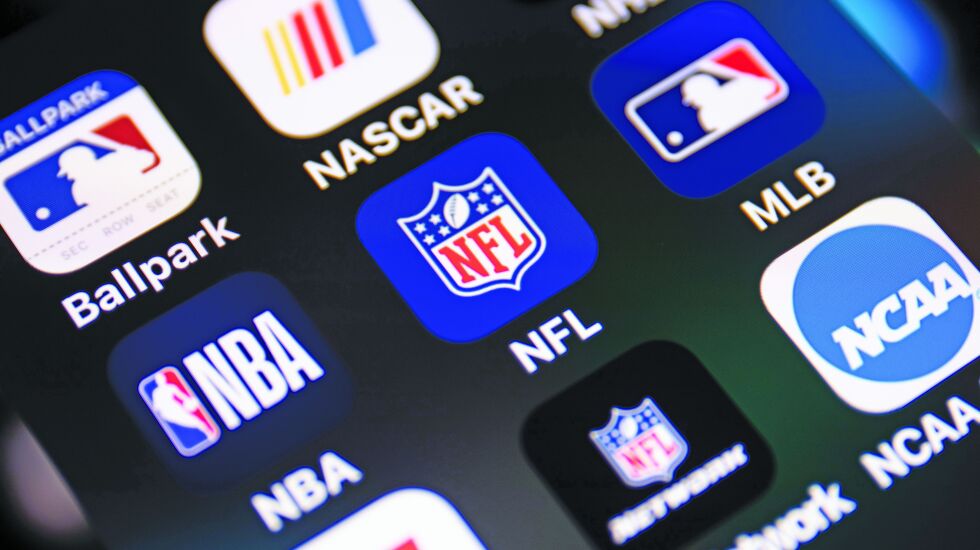
If I had the amount of sports content offered today as a kid, I would’ve flunked out of school. I used my Chandler’s more for teams’ schedules than homework assignments.
We can follow our teams through numerous resources anywhere on any device. We can interact with fellow fans anywhere on any device. And, best of all, we can watch any game anywhere on any device.
It’s a sweet table that’s always refilled, a bottomless bucket of buttery popcorn. It’s a dream come true!
It’s also overwhelming.
If you listed all the stuff available in the sports-media marketplace, you could fill an old Sears catalog. And this oversaturation isn’t limited to sports. Media research firm Parks Associates said there are more than 300 direct-to-consumer streaming services in the United States. Who can watch all that?
Back when cable was king — which wasn’t that long ago — many customers wished to have an a la carte option to avoid paying for what they didn’t watch. Now they do, but they still might need a combination of services to be satisfied. Those services add up in cost and eventually sort of resemble . . . cable.
I haven’t cut the cord yet, and I have no plans to. That’s not to say I’m against Virtual Multichannel Video Programming Distributors (vMVPDs) — that’s the nerd name for streaming services. I just prefer the navigational ease and comprehensive content that cable provides.
Believe me, I subscribe to plenty of streamers: Prime Video, ESPN+, MLB.TV, Netflix. They all satisfy a sports fix, but they’re appointment viewing. I have to go find them. On cable, the content finds me. A game or show appears while I’m channel surfing, and I become engaged in something I otherwise wouldn’t be.
So while it’s great to have “optionality,” as the honchos call it, and while I revel in the sports-content machines that churn out audio, video and written works, I’m still happy to have my old, reliable box. Coaxial cable entered my life in the mid-1980s, and it has kept me connected to the games I hold dear. You can cut your cord if you like. I prefer to splice mine.
Cable is still here, and for that, I give thanks.
Here are some other aspects of sports media for which I’m thankful:
Score bugs
I remember the first time I saw a score bug in an NFL game. Fox introduced it in 1994, its first year owning the NFC package. I recall not liking the shape of the graphic because the teams’ scores didn’t line up (my OCD at work). It didn’t even include down and distance. But it was awesome.
It was a foreign concept to football fans. Maybe that’s because it came from a foreigner, former Fox Sports chief David Hill, an Australian. He said he received death threats after debuting the “FoxBox,” but today you won’t find a game broadcast without a score bug.
They can be overwrought with information (looking at you Bally Sports), and they can take up too much space on the screen (see ESPN’s college football graphic). But they also can be spatially economical and pleasing to the eye (tip of the hat to Marquee Sports Network).
Good or bad, they’re a necessity. Could you watch a game broadcast without one?
Podcasts
If you think there are too many streaming services, guess how many podcasts are available. Roughly 2.5 million, according to reports. But here’s the thing: There’s a podcast for everyone.
I loved the TV show “West Wing.” So when I learned in 2016 that a podcast was created to rewatch and examine each episode, I was hooked. The same applies to sports. The team you root for surely has podcasts devoted to it. Some are run by reporters who cover the team, others by fans who bleed the colors of the team. Some are good, others not so much.
But they’re perfect for the fans who aren’t served by sports radio. For example, in the ’90s, I was among the Blackhawks fans jealous of all the attention the media gave the Bulls. There were few, if any, places to listen to hockey talk in this city. Now there are a number of podcasts dedicated to the Hawks.
Those would’ve been nice to have during that ’92 playoff run.
Sideline reporters
The men and women who roam the boundaries of play, braving the elements, take a lot of flak for being superfluous parts of a game broadcast. But often, viewers have no idea they’re adding to the broadcast when it’s the announcers who are weaving in the information they obtained.
Granted, some reports aren’t very insightful. But the best reporters keep a keen eye on the sidelines or benches and either share their discovery themselves or relay it to the producer. They’re a must in football games, and hockey broadcasts have benefitted greatly from reporters or analysts between the benches, who see and hear things those in the booth can’t.
Happy Thanksgiving to everyone who brings sports into our homes.
Remote patrol
The IHSA championship football games will air live Friday on The U (Channel 26.2 or 48.1) and Saturday on CW26 (Channel 26.1) from Memorial Stadium in Champaign. Classes 1A-4A play Friday and 5A-8A play Saturday. Games are scheduled for 10 a.m., 1 p.m., 4 and 7 each day.
Chris Vosters takes a break from the Hawks to call Illinois-Northwestern at 2:30 p.m. Saturday for Big Ten Network. He’ll be joined by analyst Brock Vereen and reporter Meghan McKeown.
Mitch Rosen, program director at The Score, was promoted to vice president of Audacy-owned BetQL Network, where he’ll oversee content and distribution. Rosen will remain with The Score.







